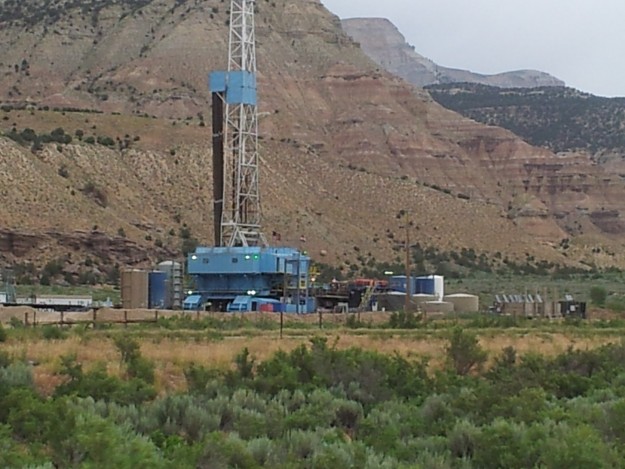Widgetized Section
Go to Admin » Appearance » Widgets » and move Gabfire Widget: Social into that MastheadOverlay zone
Groups that worked for years on BLM local control plans slam Hurd drilling bill

Newly elected Congressman Jeff Hurd was firmly behind the idea of ‘local control’ when he talked about moving the Bureau of Land Management (BLM) headquarters back to Grand Junction in November. He said the move would “better engage local stakeholders … [and] improve accountability when it comes to land management decisions.”
But four months later, Hurd turned around and introduced a bill that trashed decades of work at the local level in Colorado and handed Washington, D.C. the keys to a kingdom of over 2.3 million acres of federal land in Colorado.

The Productive Public Lands Act (PPLA), which Hurd introduced in March, singles out nine federal land Resource Management Plans (RMPs) currently approved and being used by the BLM to make land-use decisions. Five of the nine plans are in Colorado. The PPLA directs the BLM to “replace” the existing carefully-crafted plans with “alternatives” that will return land-use priorities to those expounded in the 1976 law known as the Federal Land Policy and Management Act (FLPMA).
“You’re talking about taking us back to the 80s,” says Brien Webster, Public Lands Campaign Manager for Conservation Colorado. “The resource management plans that would be undone through this would effectively be as old as I am now.”
John Stukowski, Co-Executive Director for Wild Connections, explained that he was part of the stakeholder group that worked with local BLM on the RMP for Eastern Colorado. The group labored fully eleven years until the plan was approved. That approval just happened to occur while President Joe Biden was in office, he explained, but the development took place under three administrations (Obama, Trump, Biden) and had little to do with who was in office.
“We started on the plan in 2013,” said Stukowski. “We thought it would be approved when Trump was still in office [in his first term].” But there were complications in the drafting, and the plan took longer. Which is why it was approved during Biden’s presidency.
Crafting an RMP is the definition of sausage-making. Stakeholders from recreation, hunting and fishing, agriculture, mining, oil and gas, wildlife conservationists, and tribal lands — are all represented and have a seat at the table. And facets of the same interest groups are often at odds with one another: think hikers vs. ATV’ers vs. mountain bikers; or organic farmers vs. ranchers. Making sure each group maintains fair use of the land while respecting other groups’ needs and limitations is a big ask. It’s no wonder that stakeholders, county commissioners, and conservationists hammered plans into shape over decades. And it’s no wonder that the PPLA’s introduction was met with stunned shock and outrage by dozens of organizations and politicians.
“This isn’t local control, this is political override,” protested Matt Salka, La Plata County Commissioner, in the Durango Herald last Sunday. “[Hurd] is replacing [RMPs] with a top-down mandate from Washington.”
“This legislation would force land management back into outdated frameworks – some nearly 40 years old,” said Keeley Meehan, Policy Director of the Colorado Wildlands Project. “It would create unnecessary confusion for already overstretched land managers and sideline the local voices that have been central to shaping current plans.”
At first glance, it isn’t surprising that Hurd would be introducing a bill that would give the oil and gas industry access to hundreds of thousands of acres of previously protected land. He is, after all, still making about a quarter of a million dollars a year from the oil and gas law firm Ireland, Stapleton, Pryor and Pascoe in his role as a shareholder and director. And his campaign has been raking in oil and gas money since he first declared his intention to run – including $93,600from individuals in the oil and gas industry, received $35,345 from individuals affiliated with Ireland Stapleton Pryor & Pascoe and $126,700 from individuals affiliated with Sullivan & Cromwell, another law firm that specializes in the oil and gas sector.
“We have to follow the money,” said Aly (Alainna) Belknap, executive director for Colorado Common Cause. “Hurd left the oil and gas industry to run for Congress in 2024, and he received major campaign contributions from the firm he’d been working for and their industry allies. When our public servants put private interests before the public interest, democracy suffers and our communities pay the price.”
But even the most cynical political observer has to wonder about Hurd’s wholesale betrayal of the people who live on the land he was elected to represent. After all, the oil and gas industry was at the table when the RMPs were hammered out. The areas where oil and gas exploration would be fruitful were arguably already in the “allowed to develop” area. BLM Colorado is currently offering up to 63,182 acres (almost 99 square miles) in their September 2025 and December 2025 Oil and Gas Lease Sales.
“Two-thirds of the state is already open for oil and gas leasing,” Webster says. “No one asked for this.”
“It’s not like the demand has been there. … There have been leases that have been sitting there for a while,” Stukowski adds.

So what’s it really about? Hurd’s office ignored repeated requests for comment, but Democratic challenger Alex Kelloff thinks he knows: “Congressman Hurd’s so-called Productive Public Lands Act isn’t about helping Western Colorado at all – it’s straight out of Heritage Foundation’s extremist Project 2025 playbook, just see page 523.”
Indeed, the relevant section of Project 2025 reads: “Review all resource management plans finalized in the previous four years and … restore the multi-use concept enshrined in [the 1976 law] FLPMA.”
Kelloff is infuriated by the very thought.
“It’s outrageous – he’s trampling on local control, harming our public lands, the environment, and scarce water resources, and is undermining our local energy industry, all to please the Heritage Foundation and his primary constituency, Big Oil,” he said.
It’s an odd choice for Hurd, considering his constituents have shown time and again that they support preservation and recreation on public lands over maximizing energy production. The latest polling out of Colorado and seven other Western states shows the margin against increasing drilling to be 3 to 1. Even diehard Trump voters favored conservation over energy development in the poll that came out in February. Hurd represents the largely rural southern and western parts of Colorado, including about a quarter of Eagle County.
Editor’s note: This story first appeared on the Colorado Times Recorder website.
Michelle Dally
Latest posts by Michelle Dally (see all)
- Groups that worked for years on BLM local control plans slam Hurd drilling bill - June 17, 2025
- Man whose Geo Group company runs Aurora Detention Center for ICE is also an immigrant to U.S. - March 15, 2025
- Formerly eradicated measles outbreaks could be coming soon for Colorado kids - February 20, 2025


